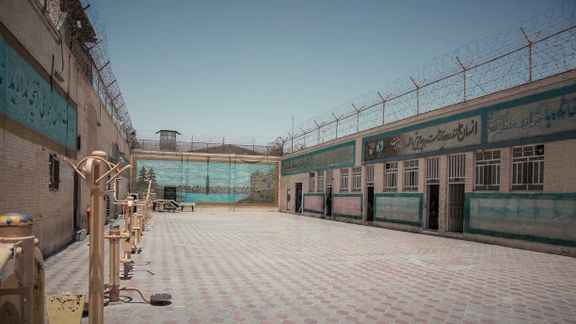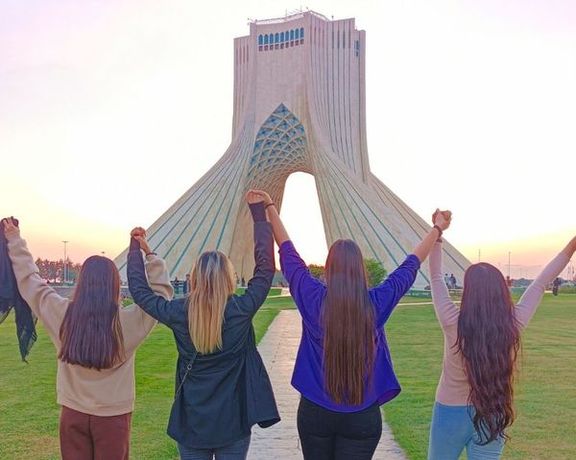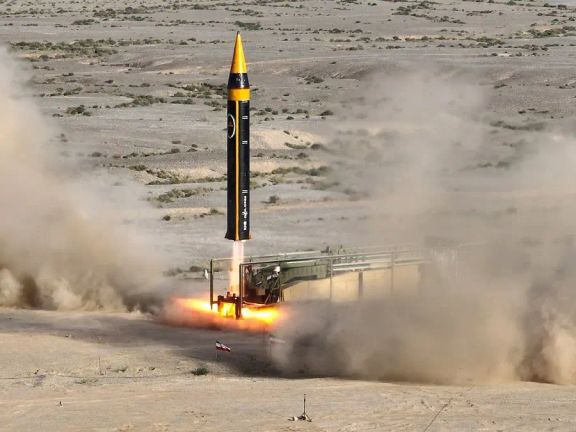Political Prisoners Beaten Up In Iran’s Yazd Prison In A Staged Fight

A human rights organization reported the beating of political prisoners in the central Iranian city of Yazd in an apparent fight staged to punish them..

A human rights organization reported the beating of political prisoners in the central Iranian city of Yazd in an apparent fight staged to punish them..
Karun Human Rights Organization said the attack happened in Yazd Central Prison June 19, during which a number of prisoners were injured.
“The prison's medical facilities were insufficient to treat the injured, and some of the prisoners were transferred to Yazd City Hospital,” added the report.
Among the injured, Mohammad Haydari, 35, from Ahvaz, is known to be a political prisoner but there is no information about his health so far.
The Arab political activist, who was sentenced to 15 years in prison on the charge of moharebeh (War against God), was stabbed in the chest.
One of the prisoners who witnessed the conflict told Karun that more than 20 Afghan prisoners were also injured.
According to this report, another Arab political prisoner named Jafar Beit Abdollah, 33, who was sentenced to 16 years in prison on the charge of moharebeh was also injured on his arm.
Karun added that most of the Afghan prisoners and some political prisoners have been transferred to solitary confinement.
Yazd Central Prison is home to about three thousand prisoners, among them over one thousand foreign nationals held in the worst conditions.
Eleven political prisoners in Yazd live in inappropriate conditions and have to endure discrimination and insults from officials and targeted conflicts inside the prison staged to harass them.

The deputy judiciary chief of the Islamic Republic of Iran says it is the regime's right to tell women what to wear.
"Hijab is a religious and political obligation, and I am surprised by those who claim that the government should not interfere in this regard,” said Mohammad Mossadegh on Friday.
"If the hijab is not observed in the street, the government has the right to interfere," he claimed.
At the same time, Asadollah Jafari, Chief Justice of Esfahan Province announced that 1,200 cases have been filed against women who refused to wear the mandatory hijab.
He also accused those women who do not observe the mandatory hijab, of "promoting vice".
These statements come as Ahmad-Reza Radan, the Police Chief of the Islamic Republic of Iran, once again threatened women regarding their hijab earlier this month.
According to him, women who put photos and videos without hijab on social media, or people who encourage others to do this will be taken to court.
Iranian women began widespread defiance of forced hijab after popular protests broke out last year when Mahsa Amini, a young woman, was killed in 'morality police' custody after getting arrested for not fully following hijab rules.
Iranian women appearing in public without headscarves has become a common sight across the country. Celebrities keep publishing photos and videos of themselves defying the regime and images of scuffles with security forces are still seen across social media on a daily basis.
While some politicians have demanded an end to compulsory hijab and laws that legalize discrimination against women, there are many others who have been talking about new methods and punishments to enforce hijab.

The United States and three of its European allies have demanded an investigation by the United Nations over Russian use of Iranian drones against Ukraine.
In a session of the Security Council on Friday, Britain, France and Albania joined the US demanding an urgent investigation after months of mass Russia drone attacks by Iranian-made Shahed kamikaze drones against Ukrainian civilian and military targets.
What was most notable is that Linda Thomas-Greenfield, US ambassador to the United Nations, told the Security Council that the deployment of Iranian drones in a foreign war is a potential violation of Council’s 2015 resolution 2231. That resolution, which accompanies the JCPOA nuclear accord, banned certain Iranian weapons exports until October 2023.
“The United Nations must implement Security Council Resolution 2231. We still have no explanation as to why experts from the 2231 team have not been dispatched to Ukraine to review evidence of these weapons’ origins, and the destruction these weapons have caused. The UN must act with urgency. This is a matter of life or death for the Ukrainian people,” the US ambassador said in her address.
Russia was one of the signatories of the Obama-era nuclear agreement that aimed to restrict Iran’s nuclear program. Resolution 2231 by extension was to deny Iran the development of weapons systems that could be used in the delivery of nuclear weapons.

US, British and French warnings about the potential violation of Res. 2231 was first voiced in mid-October, when evidence and images emerged of Iranian drones shot down by Ukraine.
The Biden administration warned about Russian plans to acquire the drones as early as in July 2022. First mass deployment of the one-way killer drones emerged in early October.
Russia uses the Shahed Unmanned Aerial Vehicles (UAVs) for three purposes. First, is to use them to hit targets, but the drones fly slowly and are very noisy. Ukrainian forces have learned to shoot most of them down. But the Russian military has used dozens of Shahed’s in many attacks during missile barrages to overwhelm air defenses and allow the more expensive missiles to penetrate Ukraine’s anti-air shield.
The third purpose, according to some experts, is simply to force Ukraine to use the expensive and limited number of its Western-supplied anti-air missiles on the Iranian drones, which are much cheaper, estimated to cost around $20,000.
The United States and its allies have imposed rounds of sanction on individuals and entities involved in assisting Iran’s drone program and their delivery to Russia. Lately, concerns have increased over reports of Russia planning to build a plant to produce the Iranian drones.
They have also told Tehran that it should stop its expanding military cooperation with Russia if it wants an agreement over its nuclear program resulting in reduction of sanctions.
“We know the Kremlin has procured hundreds of UAVs and is now working with Iran to produce these weapons inside Russia. And we know that in recent weeks, the Kremlin has used these UAVs to destroy Ukrainian infrastructure and kill and terrorize civilians,” ambassador Thomas-Greenfield told the Security Council on Friday.

Iranian nurses are forced into mandatory overtime for payments less that 40 cents per hour to make up for the shortage of healthcare practitioners.
The Iranian Labor News Agency (ILNA) on Friday cited a nurse as saying that due to lack of manpower, nurses are asked to work overtime, sometimes up to 150 or 170 hours per month in addition to their own minimum standard working hours required by law.
According to the country’s laws, a nurse has to work 150 hours per month to get paid a full salary, which is about 100 to 120 million rials, about $200 to $240, the nurse added.
Noting that overtime should not be mandatory, she said in many cases hospitals forced the overtime on the nurses who are getting paid a meager amount of 30 to 40 cents for every hour of extra work.
Nurses have held several rounds of nationwide demonstrations in the past few years to protest their low wages and the authorities’ inattention to their demands.
Driven by economic and professional problems, as well as lack of social and political freedoms, an increasing number of Iran's healthcare professionals emigrate.
Around 10,000 healthcare practitioners have left Iran over the past two years to work in the Arab world. With economic and financial conditions at rock bottom, MP Hossein Ali Shahriari, chairman of the Iranian parliament's Health and Treatment Committee, said most have gone to the Persian Gulf countries including Oman and the United Arab Emirates.

Iranian diplomatic and military officials sent contradictory messages on Friday regarding relations with Persian Gulf neighbors and regional peace and stability.
Foreign minister Hossein Amir-Abdollahian who just completed a tour of four Persian Gulf nations and returned to Tehran highlighted good relations and the importance of cooperation for the sake of “a better and more secure future.”
He visited Qatar, Oman, the United Arab Emirates and Kuwait days after Saudi Arabia’s foreign minister Prince Faisal bin Farhan went to Tehran after years of rivalry and animosity.
The foreign minister wrote on Instagram that “The Islamic Republic of Iran believes establishing mechanisms for dialogue and cooperation with all countries of the important Persian Gulf region is needed and could be beneficial more than ever before.”

At the same time Commander of the Islamic Revolution Guards Corps (IRGC) Navy Rear Admiral Ali-Reza Tangsiri said, “Any ship that wants to pass through the Strait of Hormuz must inform us of its nationality, type of cargo, and destination in Farsi, and if it does not do this, we will definitely go after it.”
This is hardly a sign of de-escalation that Western media and some officials have been referring to when describing the purpose of recent diplomatic contacts with Tehran.
In fact, Iran has seized and harassed several commercial vessels this year in the Persian Gulf and the greater region, for no clear reason, prompting the United States to increase readiness to provide maritime security.
US 5th Fleet and Combined Maritime Forces spokesperson Cmdr. Tim Hawkins told Breaking Defense earlier this month that in the past two years alone, Iran has attacked or seized 15 internationally flagged merchant vessels.
The United States announced in May that it will begin to bolster its defensive posture in the Middle East region.
“[The] United States will not allow foreign or regional powers to jeopardize freedom of navigation through the Middle East waterways, including the Strait of Hormuz,” National Security Council Coordinator for Strategic Communications John Kirby told reporters May 12, adding that there is “simply no justification” for Iranian forces to interfere, harass or attack merchant ships.
Since then, a flurry of reports have indicated that Washington has been in talks with Tehran over a possible informal arrangement to reduce tensions. The scheme, that the State Department has dismissed as erroneous reporting, would provide the Islamic Republic with financial incentives in return for a cap on the level of its uranium enrichment.
The official government news website, IRNA, publishing Tangsiri’s statement Friday added that “The Islamic Republic has also made it clear that it views US military presence in the region as a threat to its national security and a destabilizing factor in regional countries.”

A day earlier, the commander of the IRGC Aerospace Force Amirali Hajizadeh said that Iran plans to increase the range of its recently unveiled “hypersonic missile” to 2,000 kilometers from 1,400 km.
He added that the Islamic Republic of Iran has mastered all complicated technologies in the field of the defense industry, praising President Ebrahim Raisi’s government for full support, while criticizing his predecessor for restraining the missile program.

The United States should aim at deterrence, rather than containment in any deal with Iran that allows it to keep uranium enriched to 60 percent, a former top official wrote in the Washington Post.
Dennis Ross, a former special assistant to President Barack Obama, and a diplomat with long experience in the Middle East argued in an op-ed published June 23 that if reports about a new limited deal with Iran are true, the Biden administration might be changing its approach.
The deal reportedly hinges on the premise that Iran keeps its highly enriched uranium, practically making it a nuclear threshold state that could quickly decide to produce a weapon.
“Instead of seeking to prevent Iran from going nuclear as it has up until now, the United States would be tacitly shifting to a policy of accepting Iran’s nuclear status and relying on deterrence. It would be shifting from a policy of prevention to a policy of containment,” Ross argued.
He further reasoned that “Such a posture would all but guarantee nuclear proliferation across the Middle East,” where Saudi Arabia, Turkey and Egypt may decide to obtain nuclear weapons.
“The Biden administration must therefore structure any forthcoming deal with prevention — not containment — as its goal,” Ross said advocating that first, a deal limited to the end of Biden’s first term. Second, the US should make it clear that if Iran moves toward producing a weapon it will destroy all its nuclear infrastructure.
Third, the US “should conduct exercises in the region rehearsing attacks against hardened targets to underline its seriousness,” Ross underlines.